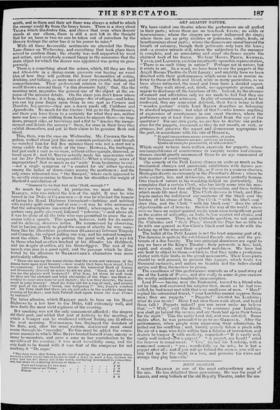ART AGAINST NATURE.
Wa have visited one theatre where the performers are all perfect in their parts ; where there are no box-book fevers; no colds or hoarsenesses ; where the singers are never indisposed (to sing); where there are no petty rivalries or jealousies, cabals, feuds or heartburnings about parts ; where the dancers are moral beyondthe breath of calumny, though their petticoats only turn the knee; and—a greater miracle still, where the subjection to the manager is complete, and an unresisting and exact obedience awaits the slightest beck of his finger. We hear Messrs. PRICE, KIMBLE, YATES, and LAPORTE, exclaim impatiently upon this representation, "There is no such thing in nature !" Perhaps not in nature, but it exists in art. In a word, we have been to see the puppets at the Argyll Rooms Theatre du Petit Lazary ; mid mightily have we been diverted with their performances, which seem to us in nowise in- ferior to those of flesh and blood, while in many particulars, as we have above intimated, the wood mid bran have a decided superi- ority. They walk about, eat, drink, use appropriate gesture, and appear to discharge all the functions of life. Indeed, by the absence of conceit and affectation only we are made to feel that they are not living actors and actresses. In play of countenance, it must be confessed, they are somewhat deficient, their faces being in that " wooden posture" which Lord BAeox describes as belonging to abashed impudence; but what of that ?—who knows anything of expression of countenance in our great theatres, where the performers are at least three glasses distant from the eye of the spectator ? For our own parts, we are free to declare our prefer- ence for the puppets, inasmuch as they do not mouth, or rant, or grimace, but preserve the aspect and demeanour appropriate to the part, in accordance with the rule of HORACE, " Si quid inexpertum scenrc committis, et audes
Personam formare novam ; scrvetur ad imum Qualls ab inccepto processerit, ct sihi constet."
Which ought to have been written expressly for puppets, whose unchangeableness of countenance in varying scenes and circum- stances should greatly recommend them to an age enamoured of that manner of consistency.
The comedy of the Petit Lazary pleases us quite as much as the mechanical changes and panoranne exhibitions with iig-ures per- forming the common actions of life as if seen in a camera obscum Harlequin diverts us extremely in the President's House ; where he nicks pockets, lies, and debauches, in a manner perfectly human. -One touch of nature in his woodship tickled us particularly. He complains that a certain Clerk, who has lately come into his mas- ter's service, has cut him off from the wine-cellar, and those bottles which made life most dear. This Clerk dresses in black, and Har- lequin makes the indifferent circumstance of the black coat the burden of his abuse of him. The Cleek " with his black coat" does this, and the Clerk " with his black coat" does the other objectionable act of honesty. Such is the way of the world : when- ever we have an unjust quarrel, we fix upon smite insigoificant point as the centre of antipathy, as bulls bellow neeinst rim' cloaks, and gore the wearers. Thus, in the Catholic question, we rail against the Catholics and " their Pope," though the Pope has as little to do with our quarrel as the- Clerk's black coat had to do with the locking up of the wine-cellar. The ballet of the Petit Lazary is not the least amusing part of it. The (lancing is quite in the established French style, and the pet- ticoats of a due brevity. The two principal danseuses are equal to any we have at the King's Theatre : their pirouette is free, bold, rapid, and steady, and their a-plomb matchless. We have but one fault to object to them,—which is, that they make a prodigious clutter with their limbs in the grand movements. Their knee-joints , should be well greased, to prevent this tapage, which beats ten thousand castanets, and makes us tremble lest the belles should spring and fling themselves to pieces.
The excellence of this performance reminds us of a good story of one of the Lords of P—, and also really in sonic degree excuses the worthy nobleman's laughable misconception. Lord P— having seen the Fantoccini, turned to a friend who
sat by him, and expressed his surprise that, much as he had tra- velled, he had never met with that very small race of men. "Men r replied his astonished friend, "your Lordship cannot suppose those men ; they are puppets." " Puppets !" retorted his Lordship ; what do you mean? Have I not seen them walk about, and heard them talk ? Puppets indeed ! you can never make me believe that."—" Well," said the friend, "to convince your Lordship, you shall go behind the scenes, and see them laid up in their boxes for the night." This the noble Lord did, and was satisfied. Some nights after, he was persuaded to go to see GARRICK. After the performance, when people were expressing their admiration, he pulled out his snuffbox ; and, having gravely taken a pinch with the air of a man who feels within him a fulness of instruction, and desires to temper it with mo&,;ty, remarked—" It is vastly well, vastly well indeed-7or a puppet." " A puppet, my Lord ! " cried the hearers in amazement. " Yes," relied his Lordship, with a composed conceit ; " yes ; wonderfully es he acts, he is but a puppet after all ; and if you will go behind the scenes, you will see him laid up for the night in a box, and perceive tile wires and strings they play him with."


















 Previous page
Previous page